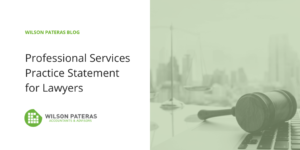
If you work in the legal profession, you will no doubt understand the importance of protecting your assets. A lifetime of wealth-building can be undone if there is a successful legal claim against you and you don’t have effective asset protection strategies in place.
If you own assets in your name, you are vulnerable to legal claims. You can potentially be sued by creditors, business partners, or a disgruntled client or staff member.
The option of owning assets in your spouse or de facto partner’s name may also not be an ideal asset protection strategy in the case of a relationship breakdown.
However, a variety of effective asset protection strategies are available. The most appropriate strategy (or strategies) for you will depend on your specific situation. Different asset protection strategies have different tax and legal ramifications. It is important to seek professional tax advice before making asset protection decisions, even if you understand all the legal implications.
Strategy 1: Using trusts
Trusts can be an effective way of protecting assets the trust ownership structure provides an added layer between you and the asset in respect of a claim. Trusts are also useful estate planning vehicles.
Different types of trusts are available, including:
- discretionary trusts,
- unit trusts,
- fixed trusts,
- family trusts, and
- testamentary trusts.
The right trust structure will depend on your specific situation. It is important to understand that different types of trusts have different tax implications. For example, a discretionary trust does not provide you with any negative gearing tax benefits on investment properties. In addition, the Victorian government charges a land tax surcharge for land held in trusts.
It is also important to note that there is a cost when transferring the ownership of assets (including into trusts). For example, you may need to pay capital gains tax (CGT) and stamp duty when transferring property assets. However, the costs of the transfer may be preferable to potentially losing the asset in a legal claim. In addition, if you set up a trust, you can purchase future assets via the trust to avoid any future transfer costs.
Strategy 2: Owning assets in your company’s name
This is an alternative to using a trust structure, however it comes with some additional risks. For example, if you are the major shareholder in your company, you could lose your shares (and therefore your assets) if you were successfully sued.
Company assets are also excluded from the 50% CGT discount on sales.
Strategy 3: Insurance
Taking out appropriate forms of insurance can be an effective asset protection strategy. Relevant insurances could include life and income protection. This insurance is especially important if you have dependents and you need to ensure their financial security as well as your own.
How we can help
If you need asset protection advice, talk to our expert team at Wilson Pateras. We specialise in accounting, tax and financial services for lawyers, barristers, solicitors and attorneys. We will take the time to understand your specific needs and provide you with the right advice.
Contact us today for a free initial consultation to discuss your situation.





